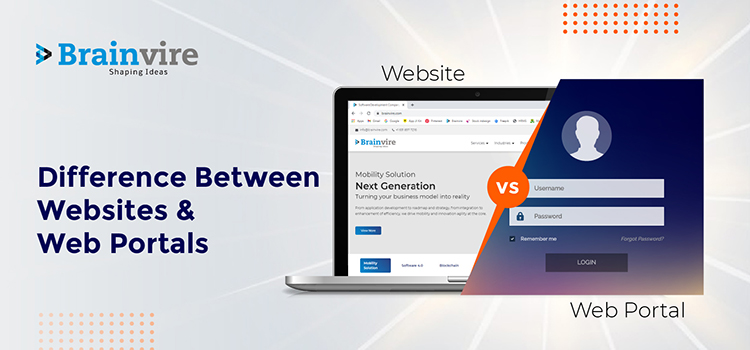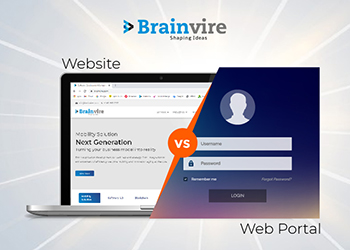
The words “website” and “portal” are often used interchangeably, and although this usage is not completely false, do you actually know the difference between website vs. portal?
When choosing what sort of online presence to use, companies have always come across a stumbling block. They waver between a website and a web portal, basically admitting that they don’t see a distinction between the two. If you find yourself in a similar dilemma, read further to understand the basic differences between a website and a web portal.
What is Interactive Website Development?
A website is a series of hosted interlinked web pages from a single domain. A website is accessible through the Internet or a private network through a Local Area Network (LAN), via an address known as a Uniform Resource Locator (URL).
While surfing the internet, we mainly use Google, which is a website, to find our answer. We use a variety of websites in our day-to-day lives for multiple purposes, such as shopping, making online purchases, using banking services, or searching for information. Not only for consumers, but the website is also a perfect way for organizations to meet their target users and boost their online footprint. Websites are also a good way to increase advertising and revenue.
What are the different types of Websites?
Static Websites
Static websites are the ones with fixed content on web pages. Until any modifications are made to it, the content remains the same throughout. There is clear plain text on these pages, or others might have rich media content as well. The same information is seen if a person visits any static page, regardless of the time of the visit.
Dynamic Websites
Any time a user visits the site, a dynamic website displays a range of content. These websites are automatically modified according to a series of criteria, such as templates, content, scripts, etc. So, the content is renewed each time a user visits a website. These websites are developed with the support of different software and languages like PHP, Python, JSP, etc.
Interactive websites
Interactive websites are defined as websites that connect and engage with people using them. These websites are rich in attractive graphics and entertaining content that helps keep users interested. On these pages, users can add their comments or leave suggestions. Most organizations favor these kinds of websites as they seem a better way to communicate with customers. Not only do they help you assess the interest of consumers, but they are also very beneficial in boosting revenue.
What is Web Portal Development?
In the words of Gartner, a digital web portal may be viewed as a superior website, or ‘a high-traffic website with a wide variety of information, services, and vendor links. Web portals provide enhanced features and immersive capabilities for diverse sectors with a single web interface that offers access to a range of data and services.
A web portal includes a variety of resources and acts as a gateway to the World Wide Web. In simpler words, it is like a management system that organizations can create, share, exchange data, or reuse data. Web portals are, unlike websites, private internet locations that can only be reached through their specific URLs, and users are required to enter their login IDs and passwords.
What are the various types of Web Portals?
B2C Portal
The B2C portal is a traditional e-commerce portal that aims to build the best possible shopping experience. It enables a shopping path to be developed from stirring curiosity in your product or service to the conclusion of the transaction.
B2B Portal
Typically, a B2B portal deals with more challenging and complex goods or services than a B2C portal. There is no room for impulse buying in B2B portals and the buying journey gets slower and requires more people.
Partner Portal
Partner portals are designed for companies that sell through indirect sales channels. A partner portal is a tool for managing your relationships with partners and persuading your partners to sell more of your products or services.
Community Portal
An outstanding way to market your brand and improve its exposure is the community platform. It is also a means of hearing what the customer feels about your goods or services and acquiring impartial insights to improve them.
Learning Portal
As people begin to shift their learning habits towards digital platforms, the need for learning portals is extremely strong. In the market sphere, learning portals can be used by organizations that wish to save the money and time they expend on educating new or current employees in person.
What’s the Difference between Websites and Web Portals
Moving on to the differences between web portals vs websites, both are quite different and can be differentiated in various aspects.
- A website specializes in attracting more users, i.e. driving traffic, while a web portal is for particular users. In a way, it filtres or reduces online traffic and allows the portal to be accessed only by unique users. You can use ASP.NET development to can create a website and web portal rich in features that are in line with your business objectives.
- A website does not ask the users to visit it for a login ID and password, but every time a user tries to open it on a web portal, login credentials are required. These passwords are user-specific and for every user, they are different.
- A website is freely available, i.e. anybody who knows the URL on the internet can visit the website to see its content. On the other hand, a website portal is privately accessible and only users of the portal can use their login ID and password to visit and access its content.
- On a website, the content can be either dynamic or static. If we speak about web portals, the content is dynamic and the content varies every time a person visits a portal.
Should You Build a Portal or a Website?
The decision to create either a website or a portal depends on your particular circumstance and requirements. Most projects can be constructed with either alternative due to the number of overlapping features between a portal and more conventional websites. Here are a few tips for when to use each one.
A Web Portal Development, if:
- You need to construct specific experiences for the audience.
- Advanced control of what users see is required.
- You have several systems that need to be combined into one visual interface.
- You need specialized functionality for user control and authorization.
A Website Development, if:
- You are designing a public website focused on content distribution and management.
- You need to have a platform that functions independently of the internal sites or systems.
- You need to attract traffic from a wide audience of people who are anonymous.
How do you choose Right Solution for your Business?
You need to weigh the interests of the project, the needs of the team overseeing it, and the existing infrastructure investments when you decide between a portal and a website. You probably need a website if your primary aim is to boost revenue and acquire new clients. If you are looking to create a public forum, a website is a good choice to have. It will represent your company on the internet and drive more traffic from around the world. You can hire developers for ASP.NET Core development services to help you out with both front end and backend development.
A portal is a logical option if the goal is to retain existing customers, boost their loyalty to your company, and increase overall brand awareness. If you need to create a hub for successful communication with your partners or suppliers or with a specific type of customer, then the web portal would be the correct fit.
Related Articles
-
Top 20 Databases to Use in 2023: A Review of the Latest Technologies and Tools
The Need for the reliability of database systems The need for database management system software is immense in the present world of digital transformation. It is important to keep track
-
What Makes NopCommerce A Perfect Choice For Ecommerce Platform?
Talking About What Makes NopCommerce A Perfect Choice For Ecommerce Platform? NopCommerce is a customizable and stable .Net-based open source e-commerce engine. It includes a wealth of services and features,
-
Features of Harmony OS You Should Know About
It was earlier this year on September 10, 2020 when Huawei presented the world with its new and powerful offering. The new innovation by the tech giant is the HarmonyOS




